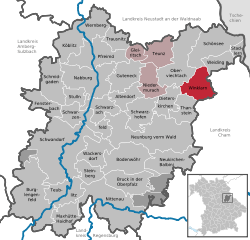Winklarn
| Winklarn | ||
|---|---|---|
| ||
 Winklarn | ||
Location of Winklarn within Schwandorf district  | ||
| Coordinates: 49°26′N 12°29′E / 49.433°N 12.483°ECoordinates: 49°26′N 12°29′E / 49.433°N 12.483°E | ||
| Country | Germany | |
| State | Bavaria | |
| Admin. region | Oberpfalz | |
| District | Schwandorf | |
| Municipal assoc. | Oberviechtach | |
| Government | ||
| • Mayor | Johann Sailer (CSU/ Parteilose Wählergem.) | |
| Area | ||
| • Total | 33.71 km2 (13.02 sq mi) | |
| Elevation | 516 m (1,693 ft) | |
| Population (2012-12-31)[1] | ||
| • Total | 1,442 | |
| • Density | 43/km2 (110/sq mi) | |
| Time zone | CET/CEST (UTC+1/+2) | |
| Postal codes | 92559 | |
| Dialling codes | 0 96 76 | |
| Vehicle registration | SAD | |
| Website | www.vg-oberviechtach.de | |
Winklarn is a municipality in the district of Schwandorf in Bavaria, Germany. In 2006, Winklarn had 1446 inhabitants. Winklarn lies in the Upper Palatinate. In the North of Winklarn, there is a large forest, the so called Frauenstein.
Winklarn was mentioned firstly in the year 1270. In 1822, a large fire devastated the centre of Winklarn. Afterwards, the large rectangular (134 m x 26 m) market place was built. In 1972, the former communities Muschenried, Haag, Schneeberg, and Pondorf were incorporated.
In 1635, 229 inhabitants died of the pest. After the remaining inhabitants prayed to St. Sebastian, the Black Death stopped. Since this time, every year St. Sebastian's Day is celebrated specially due to a promise of the inhabitants at that time.
From 1954 to 1990, Hans Thammer was major of Winklarn, his successor Hans Sailer is still major.
Winklarn lies directly at the National Road B 22 and the distances to the next motorways (A 6, A 93) are around 30 km. Until 1986, there was also a train station. In Winklarn, there is a kindergarten and a primary school.
References
- ↑ "Fortschreibung des Bevölkerungsstandes". Bayerisches Landesamt für Statistik und Datenverarbeitung (in German). 31 December 2012.
